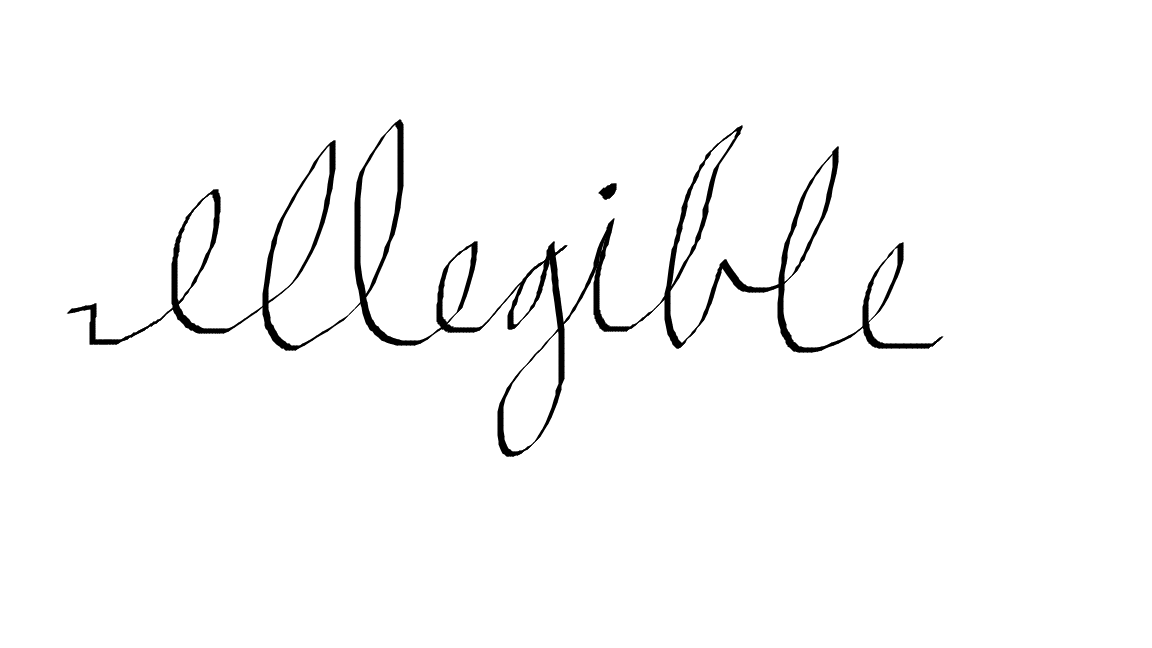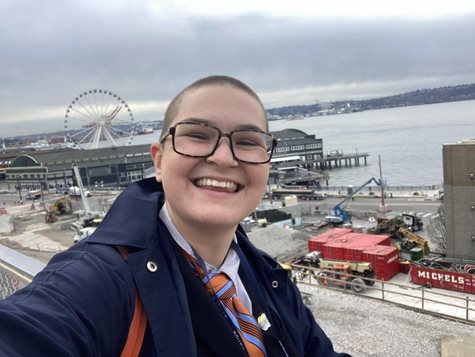November 2022

(Il)Legible
Delaney Couri
My nana and grandpa are some of the best people on the planet. Evidence of this comes from the cards that myself, my cousins, aunts, uncles, and parents get in the mail for every holiday. Everything from massive Christian and commercial holidays such as Easter to tiny oft forgotten holidays like Arbor Day don’t fall beyond the purview of nana and grandpa. There are always letters and they always get there in time, nay, early… my response? A text, because no matter how hard I try, I will never be as good as nana.
Another reason I love sending texts is that it means I can always read them. You see, my nana was raised (and taught!) how to write in beautiful cursive. Cursive that my mom inherited and that I adore, but sometimes can’t read. To me, it’s illegible. This word, illegible, has popped up a lot lately, but to me surprise, never in reference to cursive handwriting. You see, to me, illegible means that text exists that I want to read (like a handwritten letter), but I just can’t because it is either written in a style I can’t comprehend or using language that may be beyond my grasp. Legible in an academic sense is not this. It’s not the loving kindness of intergenerational letter translations. No, instead legible lately has been used in the context of “making work legible” to different academic audiences. In its most benign sense, this type of legibility is very similar to the letter writing example. The way I write for a second grader or a rhetorical communication scholar is (and should be) different. In this case, legibility is an equity issue; giving a college text to a second-grade class would be inequitable and rob them of their capacity to read it. Legibility in this sense, to me, seems like a good thing.
But legibility has also been defined for me another way and it has caused me a lot of strife. In this vernacular, making something legible means translating already good work to fit into the bounds of more “traditional” forms of scholarship. Some instances may include a scholar who does community-based work, writes blogs instead of writing journal articles, or uses other methods and mediums that are still emerging in an academic sphere. These things are considered “illegible” to more traditional academic audiences.
To make the abstract concrete, let me provide an example. Say that I perform work with a community that is important to me, combining my academic skills (as minimal as they may be) with the community members’ lived experience and knowledge to create a community project. This project may be a dialogue, a fundraiser, or a community garden; the possibilities are endless. Thus, I devote time and energy and theoretical knowledge outside of the schoolhouse walls, hopefully creating meaningful change in the process. Then, I return to my position in higher education only to be told that my project isn’t legible to them as scholarship. Why? Because it doesn’t fit outdated norms of “what counts.” Thus, meaningful work gets sidelined as service and relegated to the realm of a passion project, meaning it is seen as a detriment rather than a contributor to securing a job or tenure. Simply because it took time away from the almighty work of publishing and instead directed it
somewhere that cannot be measured by the hyper focused, scarce analytics that continue to be misused by higher education to uphold and bolster existing power relations.
Put another way, engaged work doesn’t make universities much money nor does it translate well to stale curriculum vitae, so it’s couched as less than by the broken system of academia. To make this work legible, it has to be countable. In publications or conference presentations or grants. But to me, the work doesn’t really seem to be illegible in the first place. After all, we can all “see” this work… the problem is not one of illegibility, where one desires to read something but cannot. Instead, this work is seen and read, then deemed unworthy. It is already legible; someone (more accurately, some system) is just choosing to act as if it is not. This is not news, particularly not to people holding any number of marginalized identities. Just look around most campuses in the United States and it becomes very clear that there are people who are valued more than others. People who fit better into the categories of “professor” or “student” and thus are legible as such upon sight. Legibility in this sense is willful overlooking; not generous and purposeful attempts to read a handwritten letter out of desire, but a distaste for anything that doesn’t fit in.
My queerness is not illegible; it’s ignored. Made out to be my problem to translate so others can see it in a way that makes them comfortable. My work is not illegible; it’s undervalued. Deemed unworthy and made my problem to translate into more palatable forms of work so that others can see it in ways that make them comfortable and reward it for upholding the status quo that has served them for many years. But status quos are getting boring. Hegemonic norms are outdated. So, where do we go from here?
Do we continue to squeeze ourselves into boxes that were never made for us in the first place? Contorting and twisting our bodies and our bodies of work to match what someone else finds valuable? Do we kick down the door to these spaces that already exist? Or do we walk away from these doors, recognizing that these rooms are never going to fully accept us as we are? The choice is yours (and mine). But if you’re tired of making justifications, it may be nice to recognize that you don’t owe anyone a justification for who you are or what you do. And neither do I.
